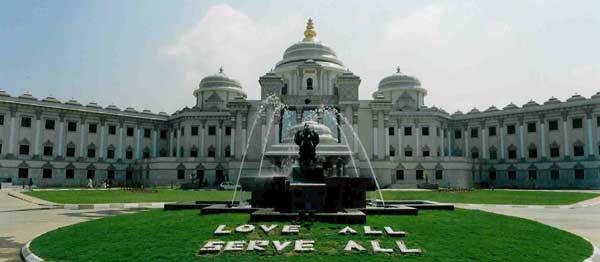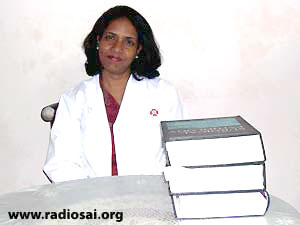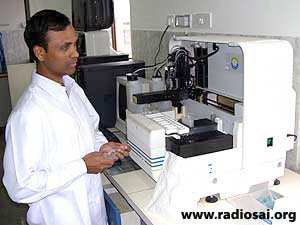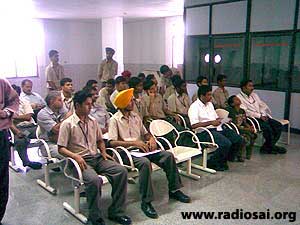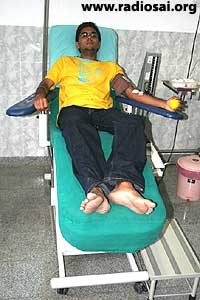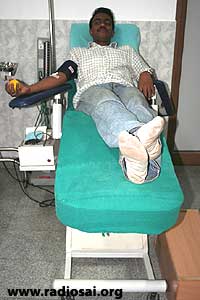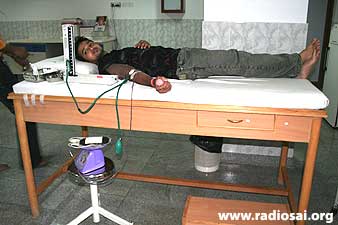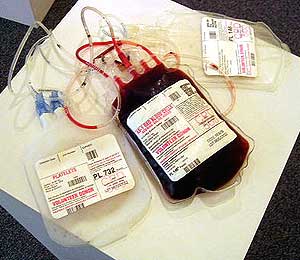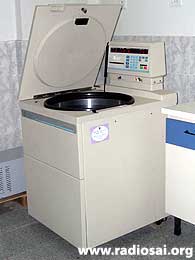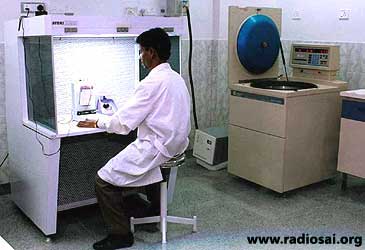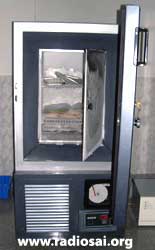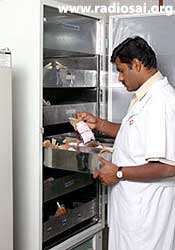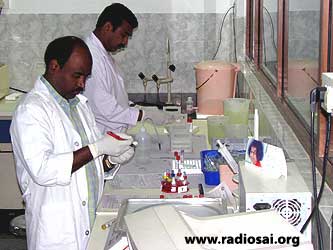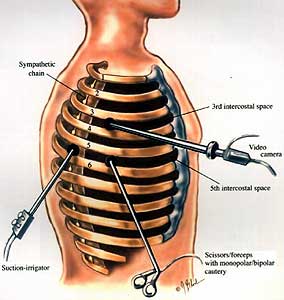 |
 |
 |
Volume
5 - Issue 11
NOVEMBER 2007 |
A UNIQUE EXPERIENCE OF ‘LIQUID LOVE’ The stirring story of the service at the Blood Bank in SSSIHMS
The piped in music fades out and a sincere voice comes on the air: “Om Sri Sai Ram. Here is an important announcement. Group A+ blood is required urgently. Willing donors may contact the Blood Bank at Ext: 317. Thank you. Sai Ram." Within 10 minutes of the announcement, five donors with A+ blood reach the blood bank of the Sri Sathya Sai Institute of Higher Medical Sciences, Whitefield, Bangalore. A thirty two year old housewife has to be operated for a brain tumour. During the planning stage of her surgery, it becomes clear that she will require large quantities of cryo-precipitate, a component of blood, during the operation. The surgeons inform the blood bank regarding the requirement and in no time, they are able to post her for surgery. During the course of her treatment, she receives a total of 138 units of cryo-precipitate and 26 units of whole blood and components! The surgery turns out successful and she is able to go back home to her family, completely cured, happy and whole! Another patient is a 29-year old man from Bangalore. He needs to be operated upon for an aortic aneurysm. During his post-operative phase, he receives a total of 46 units of blood and components. This time too, the blood bank promptly organises blood and its components in the required quantities. His recovery too is smooth and uneventful.
The Blood Bank of the Sri Sathya Sai Institute of Higher Medical Sciences has become its perennial source of the life-saving elixir needed in such complicated surgeries. Many such patients consider themselves lucky to have been treated at Bhagavan Baba’s Hospital, a state-of-the-art tertiary care medical facility set up in Whitefield, Bangalore, for those most in need. It not only offers the entire medical treatment totally free of cost, but also relieves the patient and family of the burden of organizing blood for the surgery involved, a practice quite common in Indian hospitals – both government and private, including the very expensive ones. We all know nearly all major surgeries require safe blood to replenish the loss suffered during prolonged procedures. Most hospitals depend either on the patient’s families to provide the needed quantities of the right match or ask them to pay for the supply the hospital may arrange for them from outsourced agencies. But such a mercenary practice holds no place in the Sathya Sai Medicare system where the only currency that is traded freely is pure, unconditional love. Many of the patients who depend upon Bhagavan Baba’s compassion and generosity for their treatment are typically so poor that they can’t even afford a train ticket to reach His Hospital from the various parts of the country and neighbouring nations. At Bhagavan Baba’s directive, His hospitals provide the patients with all necessary facilities during their treatment. Once a patient enters the warmth of the Sathya Sai Healthcare system’s embrace, both the patient and his/her family heave a sigh of relief because the system shoulders the entire responsibility of patient care in every conceivable area, which includes arranging for the needed blood supply during and after surgery.
Dr. Nandita Ghosal, the Blood Bank Officer who heads the Hospital’s blood bank, comparing her tenure with the Sri Sathya Sai Institute with other hospitals she has worked earlier, says, “In other hospitals, blood can become very difficult to organise, especially in cases of rare blood groups. "I’ve seen many cases elsewhere, where surgeries had to be cancelled due to lack of blood, where cases had to be terminated before the completion of the surgery, and worse still, where a patient’s life was lost due to loss of blood. “Whatever may be the case, in outside hospitals the patient needs to pay for the supply. The prices per unit range anywhere from Rs. 300/- to Rs.1500/- per unit. (On an average, most surgeries need 1-6 units of blood, and the requirement can even exceed 50 units in rare cases). It is true that there are costs involved in screening the blood and ensuring it is safe for transfusion, but the present prices of blood far outweigh the actual costs. It is unfortunate that blood has also become a commodity whose price is dictated by its demand and supply,” she says. "Here, in our Hospital, with Bhagavan’s Grace and the generosity of the people who have been touched by the service His Institution is rendering, arranging blood, even of rare groups, has never posed a major problem. Any amount of stress is harmful to the patient and impedes his or her healing. When everything, including blood, is taken care of, the healing is accelerated. It makes such a difference to the patient’s family and also to his or her recuperating process. When we say 'free treatment', we mean it, in all respects,” says Dr. Ghosal. Answering a Life Saving Need
Explaining the blood collection procedure, Mr. J. Sai Kiran, Senior Manager of the Hospital’s Laboratory and Blood Bank, explains, "Our Institute is licensed by the Regional Drug Controller to collect, store, process and transfuse blood, as per the prescribed norms. As far as procedures and standards are concerned, there is no difference between our blood bank and any other widely known blood banks. We maintain the same quality standards, and on many counts exceed them. What makes the Sathya Sai Blood Bank stand apart is the purpose behind our existence. Whereas other blood banks supply blood for a price to the individual, our blood bank collects blood only for the in-patient requirements of our Institute. The patient is absolved of all responsibility of finding the adequate supply, the right match or making any payment.” Hear him narrate the patient's story. “The lady had a complicated blood disorder called dysfibrinogenemia, due to which blood clots very slowly. Her thrombin time (TT), one of the indicators of clotting efficiency, was almost three times than that of a normal person. The TT parameter could be improved, i.e. the TT could be brought down by transfusing the patient with cryo-precipitate. In the concerned case, she was given 55 units of cryo before surgery and 83 units after surgery, along with 26 units of whole blood. This worked wonders as her TT improved considerably. This episode shows to what extent Swami's Hospitals can go to help a patient. We could have simply denied the patient treatment quoting high risk, but we went the extra mile to save a 32 year young life.” For the 6-8 surgeries, which take place in both the Cardiac and Neuro departments of the Bangalore Hospital everyday, approximately 45 units of blood and components are required on a daily basis. In complicated cases, the daily requirement of blood and the components can go up to 80-100 units. What makes the effort even more unique is that almost 98% of the blood is collected on a voluntary basis i.e. for every 100 units of blood collected, 98 units are donated by voluntary donors! These are healthy men and women who appreciate the pure motivation of the Sathya Sai Healthcare system and the benefits it is delivering to the poorest of the poor in the highest professional manner possible. The goodness of the system evokes such altruism and generosity from them. Only a miniscule portion of the donors include members of the patient's family. The other 2 % is through autologous (from the patient himself) and directed donations. From January, 2001 till September, 2007, a total of 23,281 units of blood, have been collected, which upon processing makes close to 45,000 units of whole blood and blood components. Inspiring the Gift of Life Such a generous supply of this sap of life comes to the Hospital largely due to the support of the Seva Dal or the service wing volunteers of the Sri Sathya Sai Service Organisation mainly from the state of Karnataka. These dedicated volunteers play a very vital role in mobilizing donors. They organise batches of college students and employees of many private and government companies to come to the Hospital and share the gift of life that is in each of us to give.
Mr. K. Viswanath, Bangalore District Service Coordinator, plays a pivotal role in creating awareness about the Hospital and the need for blood across various colleges and companies in the area. He says, “When the Hospital came into being, we visited many colleges in Bangalore to explain to their management the nature of the Hospital and sought their help in mobilizing students for blood donations. No one has ever disagreed with the nobility of the mission. “As well, the devotees of Baba and the former students of the Bal Vikas program (Sathya Sai Education in Human Values) have now emerged as another reliable group for us. Growing up nurturing the human values that Bhagavan Baba personifies, many of them are now employed in various companies where they inspire and encourage their colleagues to follow in their example and donate blood. There have been instances when devotees have traveled over 75 kms just to donate blood. Enthusiasm, civic consciousness and caring are such contagious and uplifting qualities that over the years, many colleges and companies have made it a part of their work culture to come and donate blood at our Institute.
For example every year, employees from TVS Motors, Hosur come and donate blood, as do the employees of GE Medical Systems, SAP Labs, SRIT, TCS and Ram Kumar Mills. We also receive college students from the MVJ Group of Educational Institutions, RBANMS (Ulsoor), Acharya Institutions (Peenya) and many other institutes, including the nearby Brindavan campus of the Sri Sathya Sai University. Such is the overwhelming response from the community to the Hospital’s blood needs that we do not even need to use the print media but rely mostly on word of mouth. Sometimes we announce in the local Sai Centres and only occasionally post notices in order to create awareness about the need for blood,” he adds.
"The procedure for blood donation is very simple,” explains Mr. Sai Kiran, the blood bank manager. “After filling out a form and screening the donor for suitability for blood donation, she/he is bled by the phlebotomist. Usually 350 to 450 cc of blood is collected from each donor in a blood bag, which contains chemicals to prevent it from clotting and provides food for the live cells. The process of bleeding is completed within 10 minutes. Once the donation is completed, the blood donor is given a mandatory snack even as they are observed for their well-being.”
The treat for the donor includes a glass of flavoured milk, biscuits, nuts and dry fruits. Before he or she leaves the blood bank, each donor receives a packet of vibuthi or the sacred ash, an appreciation card, a photo-calendar of Baba and of course, the inexpressible joy that accompanies any act of selfless giving and participation in the treatment of an ailing fellow being. “In the case of large groups of donors, we provide a conducted tour of the Hospital and also screen a film about the work being done here. We capitalize the blood donation opportunity by turning it into a memorable experience which every blood donor may cherish. He or she is made aware that they have made a real difference - in most cases, the difference between life and death,” Kiran adds. A Safe and Perfect Procedure During blood donation, normally 350 cc of blood known as one 'unit' is drawn from the donor. The body makes up the loss in volume within a couple of hours and in cells within a few days. However, as per national norms, between successive blood donations, a 3-month gap is mandatory and there are also certain health conditions the donor should meet in order to be able to safely donate blood. After collection, the blood is tested for HIV, HbsAG, HCV and Syphilis, then cross-matched with the patient's blood to ensure there is no adverse reaction between the patient’s blood and the donor’s blood. The blood may be separated into components, namely packed red cells, plasma, platelets and cryo precipitate.
The advantage of componenting is to provide the patient a tailor-made solution for his requirement. If a patient is anaemic, she requires hemoglobin or packed red cells, whereas if patient is low on protein, he requires plasma. If the blood component is not separated, both the patients would have received whole blood. Thanks to componenting, from the donor's point of view, his or her blood can benefit more than one patient, a truly gratifying thought.
“The whole blood and its components are stored in special refrigerators, which maintain the temperature at a precise degree. Once the request comes from the operation theatres, the blood bags are thawed (in case of frozen components) to reach room temperature and after the required cross-match tests they are then sent up to the operation theatres through the responsible and reliable Seva Dal volunteers and ward boys.
Sai Kiran, along with technicians and biomedical engineers, is also responsible for the proper running of the equipment used in the blood collection, screening, processing and storage, which are all state-of-the-art, and well-maintained. He is accountable for maintaining the necessary documentation for scrutiny by the Drug Controller during regular inspections – a prerequisite for renewing the Institute's license to collect blood. It is the dedication of the entire team which ultimately ensures that the patients receive safe blood. Finding a Blood Angel
The efficiency and sincerity of the system continues to grow on others, such as its donors. Many are the instances where blood donors, receiving a call from the Hospital rush from their place of work or home at odd hours to donate blood. Supratim Roy’s is one such instance. A software engineer by profession, he works in a private company in Electronics City, situated in the suburbs of Bangalore. As a person with O-negative blood, one of the rarest blood groups, he is in constant demand. For instance, once when O-negative blood was urgently required for a case, Sai Kiran was able to obtain his contact details from the internet and contact Supratim around 8 pm in the evening. Even though still at work, Supratim Roy drove 30 kilometres to come down to the hospital. After seeing the Institute setup and knowing that his blood would not be sold, as he had observed during his earlier blood donations elsewhere, Supratim was glad and offered to come again, whenever there’s a need for blood of his group. Recalling his primary phone call to Supratim, Sai Kiran, who has himself donated 23 times since he joined the Hospital in 2001, says, "During the first phone call, when I explained to Supratim about the patient, he turned suspicious and enquired whether I was related to the patient! He probably thought I was some kind of a middle-man, arranging for the blood for a small fee! I could make out that he was unable to believe that we were taking such pains to organise blood at our Hospital, all for free. Thanks to the positive understanding Supratim has now acquired about the Institute, he is always ready to help us, and is a mere phone call away!" No Greater Gift
Blood is the rare gift of life that still cannot be made outside the human body. It is a perishable commodity with an expiry period of 35 days. Surgeons generally prefer to use fresh blood, especially in paediatric cases, where they prefer blood collected less than 72 hours ago. Care is therefore taken to collect only the needed groups of blood and in the required quantities, as per the needs of the patients awaiting surgery. The Sathya Sai Blood Bank takes special care to optimize on this valuable resource. The surgeons play an important role in its responsible use by performing surgeries using improved techniques, which minimize blood loss. Beating heart surgeries, minimally invasive surgeries and endoscopic procedures are means by which the blood requirement, as compared to traditional surgeries, is reduced to a great extent. In cases of very rare groups, through an autologous donation, the patient is requested to donate blood before surgery, and the same blood is transfused back during his or her own surgery. This is also the safest type of blood that a patient can get. Research is also on to prepare a substitute for blood, which can perform the same functions as the human blood. It would, of course, take many years before it can be made available for use, and that too, at a reasonable price. Till then hospital systems across the world will continue to rely on fellow human beings to donate this life-giving element.
For a super-specialized facility where complicated surgeries are conducted every day, lives hinge on the timely availability of blood in the needed group. Luckily, the Hospital’s donors realize this fact and rejoice in their good fortune to be able to share this gift of life as their two drops worth in the colossal humanitarian project of Bhagavan Baba. With time, the unique Sathya Sai Healthcare system is not only providing free of cost tertiary medical care that meets the eye but also creating greater sense of civic consciousness, unconditional love and service opportunities for thousands who joyfully come forward to save the lives of seemingly complete strangers. In the end, every donor realizes an inner connection with everyone else that gets further strengthened by the common blood line that they now share with a patient. Baba says, “There is only one caste, the caste of Humanity. And one is conferred with true happiness, only when he or she is of help to others. Service has twin benefits – inner joy to oneself and happiness to others.” When we help another heal, we heal ourselves of our selfishness, and when we help save a life, we widen our mental horizons and broaden our own hearts. A million life lessons from a single act of kindness make the act of blood donation in this Hospital a truly spiritual and elevating experience.
- By B Satish Chandra Dear Reader, did this article inspire you in any way? Would you like sharing your feelings with us? Please write to us at h2h@radiosai.org mentioning your name and country. Thank you for your time.
|
|
Vol 5 Issue 11 - NOVEMBER 2007
|
Best viewed in Internet Explorer - 1024 x 768 resolution. |


